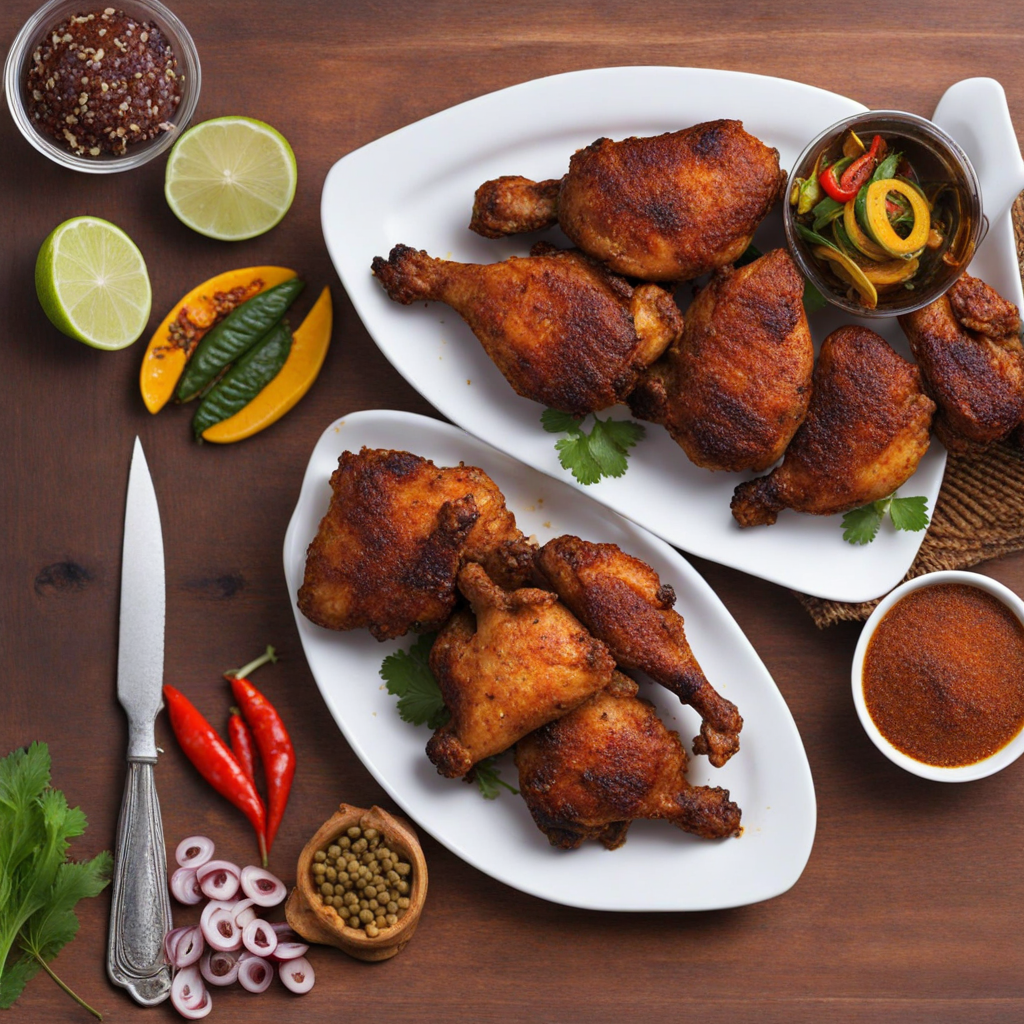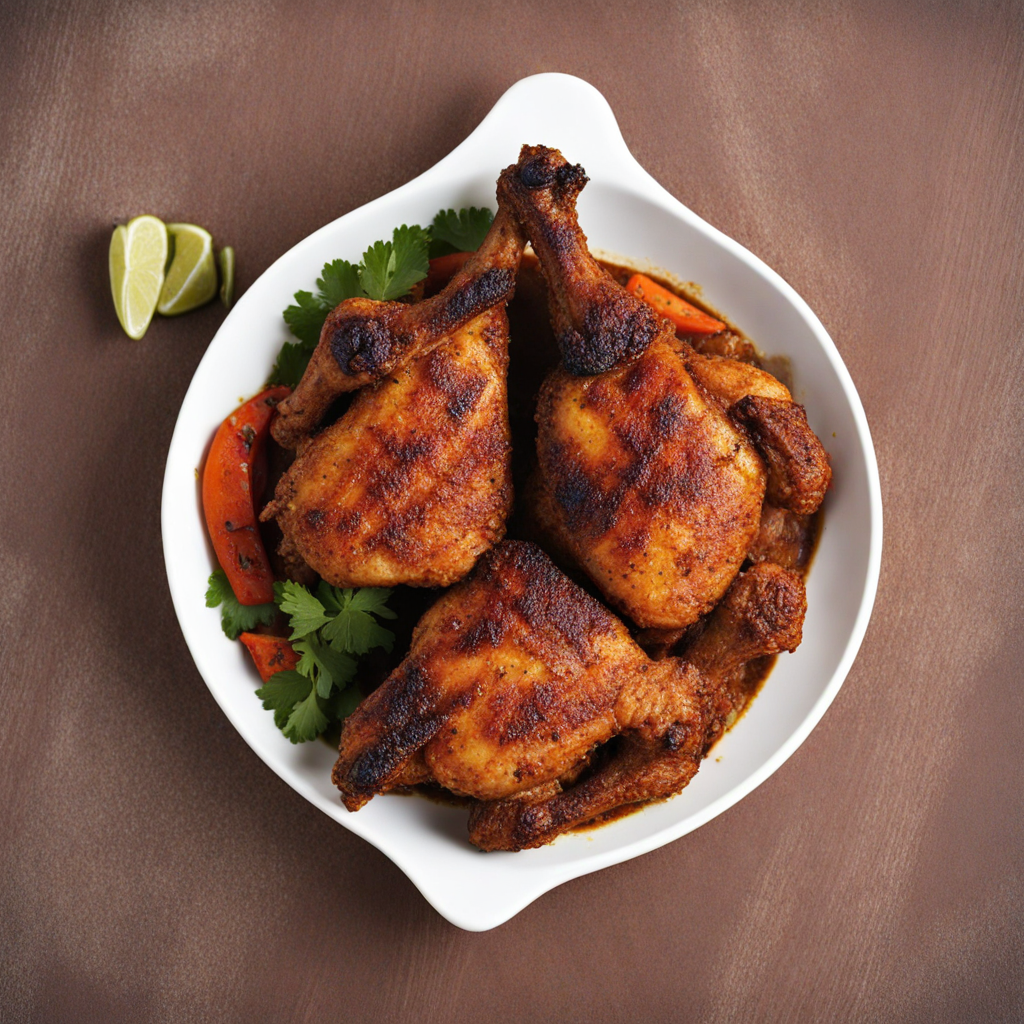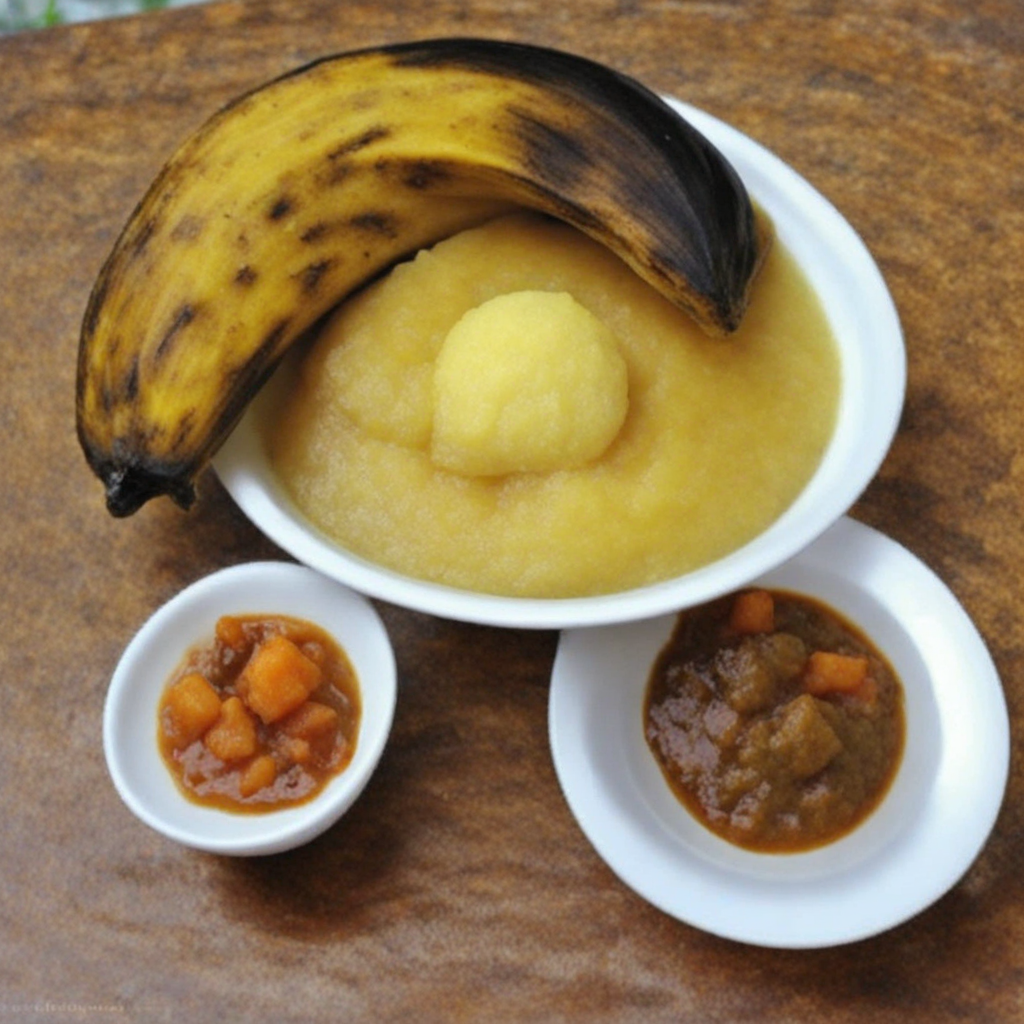Spiced Chicken
Spiced Chicken from Ghana is a vibrant and aromatic dish that showcases the rich culinary heritage of West Africa. The chicken is marinated in a blend of bold spices, including ginger, garlic, paprika, and a hint of cayenne pepper, providing a delightful kick that tantalizes the taste buds. The marinade is often complemented by the addition of fresh herbs such as thyme and parsley, which infuse the meat with a fragrant aroma, making it irresistible. The marination process allows the flavors to penetrate deep into the chicken, ensuring each bite is packed with a savory punch. Once marinated, the chicken is typically grilled or roasted to achieve a crispy, golden-brown exterior while maintaining tender, juicy meat on the inside. The cooking method enhances the smoky flavors from the grill, adding an extra layer of depth to the dish. In Ghana, Spiced Chicken is often served alongside traditional sides such as jollof rice, fried plantains, or a refreshing salad, creating a well-rounded meal that reflects the country's love for vibrant and hearty food. The experience of enjoying Spiced Chicken is not just about the taste but also about the communal aspect of dining in Ghana. It is often shared among family and friends during gatherings, celebrations, or casual meals, emphasizing the importance of togetherness in Ghanaian culture. With its tantalizing flavors and inviting aroma, Spiced Chicken is a culinary adventure that invites you to savor the essence of Ghanaian cuisine.
How It Became This Dish
The History of Spiced Chicken in Ghana: A Culinary Journey Ghana, located along the Gulf of Guinea in West Africa, boasts a rich tapestry of culture, history, and food. Among the myriad of dishes that define Ghanaian cuisine, Spiced Chicken stands out as a beloved staple. Its origins, cultural significance, and evolution reflect the country's vibrant culinary landscape, shaped by historical influences, local ingredients, and the intermingling of traditions. Origins of Spiced Chicken Historically, chicken has been a prominent source of protein in Ghana, with its domestication tracing back thousands of years. The indigenous peoples of West Africa cultivated chickens long before colonial influences set in. Evidence suggests that the domestication of the chicken occurred around 3000 BCE in Southeast Asia and spread westward through trade and migration routes. By the time the Akan people, a major ethnic group in Ghana, began to settle in the region, they had already integrated chickens into their diets. The preparation of chicken in Ghana has always involved spices, as they are integral to the region's culinary identity. Traditional spices such as ginger, garlic, pepper, and various local herbs have been used for centuries, reflecting both the land's agricultural bounty and the culinary knowledge passed down through generations. The introduction of new spices during the transatlantic trade and colonial period, including influences from European, Middle Eastern, and Asian cuisines, further enriched Ghanaian cooking. Cultural Significance In Ghana, food is more than sustenance; it is a vital aspect of social life and cultural identity. Spiced Chicken, often marinated and grilled or fried, is emblematic of communal gatherings and celebrations. It features prominently in various ceremonies, from weddings to festivals, where it is often served alongside traditional staples like jollof rice, banku, or fufu. The preparation of Spiced Chicken is often a communal activity. Families and friends come together to marinate the chicken, sharing stories and laughter as they bond over the meal. This communal aspect reinforces social ties and reflects the importance of hospitality in Ghanaian culture. When guests arrive, serving Spiced Chicken is a gesture of warmth and generosity, emphasizing the belief that food should be shared. Moreover, Spiced Chicken plays a role in religious and cultural festivals. During important celebrations such as Eid, Christmas, and local festivals like Homowo, it is common to prepare large quantities of Spiced Chicken to honor guests and commemorate the occasion. The dish also symbolizes abundance and prosperity, making it a favored choice for significant life events. Development Over Time As Ghanaian society evolved, so too did the preparation and presentation of Spiced Chicken. The post-colonial era marked a period of culinary exploration and fusion, as chefs and home cooks began to experiment with different flavors and techniques. The emergence of fast food and the globalization of culinary practices also influenced how Spiced Chicken was prepared and enjoyed. In urban areas, the rise of street food culture transformed the consumption of Spiced Chicken. Vendors began to specialize in grilled or fried chicken, marinated in a mix of local spices and served with a variety of dips and sides. This adaptation made the dish accessible to a broader audience, allowing it to become a popular choice among the youth and working-class populations. The street food version, often enjoyed on the go, highlights the convenience and flexibility of Spiced Chicken in modern Ghanaian life. Furthermore, with the advent of social media and the internet, recipes for Spiced Chicken have proliferated, leading to a greater exchange of culinary ideas. Influencers and food bloggers showcase unique recipes, often incorporating international flavors or modern cooking techniques. This innovation keeps the dish relevant in contemporary Ghanaian cuisine while honoring its traditional roots. Global Recognition As Ghanaians have migrated abroad, they have carried their culinary traditions with them. Spiced Chicken has found its way into the diaspora, where it continues to be a source of comfort and nostalgia for Ghanaians living away from home. Restaurants serving Ghanaian cuisine have sprung up in cities around the world, with Spiced Chicken often featured on their menus. This global recognition has not only introduced international audiences to Ghanaian flavors but has also fostered a sense of pride among Ghanaians living abroad. Additionally, the fusion of Ghanaian cuisine with other culinary traditions has given rise to unique takes on Spiced Chicken. For instance, some chefs experiment with barbecue techniques influenced by American cooking or incorporate Caribbean spices, blending the flavors of different cultures. These adaptations not only showcase the versatility of Spiced Chicken but also highlight the interconnectedness of global food traditions. Conclusion Spiced Chicken is more than just a dish in Ghana; it is a reflection of the country's history, cultural values, and evolving culinary practices. From its origins in traditional farming to its role in communal celebrations, Spiced Chicken embodies the essence of Ghanaian hospitality and community. The dish has adapted over time, embracing influences from both local and global cuisines, allowing it to thrive in an ever-changing culinary landscape. Today, Spiced Chicken continues to be cherished not only for its flavor but also for the memories and connections it fosters among people. It serves as a delicious reminder of the rich history of Ghanaian food, a testament to the resilience and creativity of its people, and a symbol of the enduring power of food to unite and celebrate life’s moments. In every bite, one can taste the history, the culture, and the heart of Ghana.
You may like
Discover local flavors from Ghana







